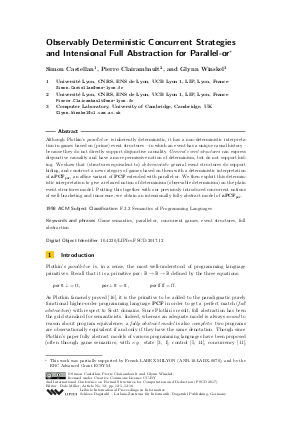Observably Deterministic Concurrent Strategies and Intensional Full Abstraction for Parallel-or
Authors Simon Castellan, Pierre Clairambault, Glynn Winskel
-
Part of:
Volume:
2nd International Conference on Formal Structures for Computation and Deduction (FSCD 2017)
Part of: Series: Leibniz International Proceedings in Informatics (LIPIcs)
Part of: Conference: Formal Structures for Computation and Deduction (FSCD) - License:
 Creative Commons Attribution 3.0 Unported license
Creative Commons Attribution 3.0 Unported license
- Publication Date: 2017-08-30
File

PDF
LIPIcs.FSCD.2017.12.pdf
- Filesize: 0.63 MB
- 16 pages
Document Identifiers
Subject Classification
Keywords
- Game semantics
- parallel-or
- concurrent games
- event structures
- full abstraction
Metrics
- Access Statistics
-
Total Accesses (updated on a weekly basis)
0Document
0Metadata
Abstract
Although Plotkin’s parallel-or is inherently deterministic, it has a non-deterministic interpretation in games based on (prime) event structures - in which an event has a unique causal history - because they do not directly support disjunctive causality. General event structures can express disjunctive causality and have a more permissive notion of determinism, but do not support hiding. We show that (structures equivalent to) deterministic general event structures do support hiding, and construct a new category of games based on them with a deterministic interpretation of aPCFpor, an affine variant of PCF extended with parallel-or. We then exploit this deterministic interpretation to give a relaxed notion of determinism (observable determinism) on the plain event structures model. Putting this together with our previously introduced concurrent notions of well-bracketing and innocence, we obtain an intensionally fully abstract model of aPCFpor.
Cite As Get BibTex
Simon Castellan, Pierre Clairambault, and Glynn Winskel. Observably Deterministic Concurrent Strategies and Intensional Full Abstraction for Parallel-or. In 2nd International Conference on Formal Structures for Computation and Deduction (FSCD 2017). Leibniz International Proceedings in Informatics (LIPIcs), Volume 84, pp. 12:1-12:16, Schloss Dagstuhl – Leibniz-Zentrum für Informatik (2017)
https://doi.org/10.4230/LIPIcs.FSCD.2017.12
BibTex
@InProceedings{castellan_et_al:LIPIcs.FSCD.2017.12,
author = {Castellan, Simon and Clairambault, Pierre and Winskel, Glynn},
title = {{Observably Deterministic Concurrent Strategies and Intensional Full Abstraction for Parallel-or}},
booktitle = {2nd International Conference on Formal Structures for Computation and Deduction (FSCD 2017)},
pages = {12:1--12:16},
series = {Leibniz International Proceedings in Informatics (LIPIcs)},
ISBN = {978-3-95977-047-7},
ISSN = {1868-8969},
year = {2017},
volume = {84},
editor = {Miller, Dale},
publisher = {Schloss Dagstuhl -- Leibniz-Zentrum f{\"u}r Informatik},
address = {Dagstuhl, Germany},
URL = {https://drops.dagstuhl.de/entities/document/10.4230/LIPIcs.FSCD.2017.12},
URN = {urn:nbn:de:0030-drops-77219},
doi = {10.4230/LIPIcs.FSCD.2017.12},
annote = {Keywords: Game semantics, parallel-or, concurrent games, event structures, full abstraction}
}
Author Details
References
-
Samson Abramsky, Kohei Honda, and Guy McCusker. A fully abstract game semantics for general references. In LICS, Indianapolis, Indiana, USA, June 21-24, 1998, pages 334-344. IEEE Computer Society, 1998.

-
Samson Abramsky, Radha Jagadeesan, and Pasquale Malacaria. Full abstraction for PCF. Inf. Comput., 163(2):409-470, 2000.

-
Samson Abramsky and Guy McCusker. Linearity, sharing and state: a fully abstract game semantics for idealized algol with active expressions. ENTCS, 3:2-14, 1996.

-
Samson Abramsky and Paul-André Melliès. Concurrent games and full completeness. In LICS, Trento, Italy, July 2-5, 1999, pages 431-442. IEEE Computer Society, 1999.

-
Robert Cartwright, Pierre-Louis Curien, and Matthias Felleisen. Fully abstract semantics for observably sequential languages. Inf. Comput., 111(2):297-401, 1994.

-
Simon Castellan and Pierre Clairambault. Causality vs. interleavings in concurrent game semantics. In CONCUR 2016, August 23-26, 2016, Québec City, Canada, pages 32:1-32:14, 2016.

- Simon Castellan, Pierre Clairambault, Silvain Rideau, and Glynn Winskel. Games and strategies as event structures, 2016. Submitted, URL: https://arxiv.org/abs/1604.04390.
-
Simon Castellan, Pierre Clairambault, and Glynn Winskel. The parallel intensionally fully abstract games model of PCF. In LICS, Kyoto, Japan, July 6-10, 2015, pages 232-243. IEEE Computer Society, 2015.

- Marc de Visme and Glynn Winskel. Strategies with Parallel Causes. In Valentin Goranko and Mads Dam, editors, 26th EACSL Annual Conference on Computer Science Logic (CSL 2017), volume 82 of Leibniz International Proceedings in Informatics (LIPIcs), pages 41:1-41:21, Dagstuhl, Germany, 2017. Schloss Dagstuhl - Leibniz-Zentrum für Informatik. URL: http://dx.doi.org/10.4230/LIPIcs.CSL.2017.41.
-
Dan R. Ghica. Applications of game semantics: From program analysis to hardware synthesis. In LICS, 11-14 August 2009, Los Angeles, CA, USA, pages 17-26. IEEE Computer Society, 2009.

-
Dan R. Ghica and Andrzej S. Murawski. Angelic semantics of fine-grained concurrency. Ann. Pure Appl. Logic, 151(2-3):89-114, 2008.

-
Tom Hirschowitz. Full abstraction for fair testing in CCS (expanded version). Logical Methods in Computer Science, 10(4), 2014.

-
J. M. E. Hyland and C.-H. Luke Ong. On full abstraction for PCF: I, II, and III. Inf. Comput., 163(2):285-408, 2000.

-
James Laird. Full abstraction for functional languages with control. In Proceedings, 12th Annual IEEE Symposium on Logic in Computer Science, Warsaw, Poland, June 29 - July 2, 1997, pages 58-67. IEEE Computer Society, 1997.

-
Paul-André Melliès and Samuel Mimram. Asynchronous games: Innocence without alternation. In CONCUR, Lisbon, Portugal, September 3-8, 2007, volume 4703 of Lecture Notes in Computer Science, pages 395-411. Springer, 2007.

-
Gordon D. Plotkin. LCF considered as a programming language. Theor. Comput. Sci., 5(3):223-255, 1977.

-
Silvain Rideau and Glynn Winskel. Concurrent strategies. In LICS, June 21-24, 2011, Toronto, Ontario, Canada, pages 409-418, 2011.

-
Glynn Winskel. Events in computation. PhD Thesis, Edinburgh University, 1980.

-
Glynn Winskel. Event structure semantics for CCS and related languages. In ICALP, Aarhus, Denmark, July 12-16, 1982, Proceedings, pages 561-576, 1982.

-
Glynn Winskel. Event structures. In Petri Nets: Central Models and Their Properties, Advances in Petri Nets 1986, Part II, Proceedings of an Advanced Course, Bad Honnef, 8.-19. September 1986, pages 325-392, 1986.

-
Glynn Winskel. Deterministic concurrent strategies. Formal Asp. Comput., 24(4-6):647-660, 2012.

-
Glynn Winskel. Strategies as profunctors. In FOSSACS, Held as Part of ETAPS 2013, Rome, Italy, March 16-24, 2013, pages 418-433, 2013.

